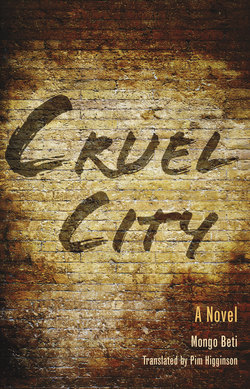Читать книгу Cruel City - Mongo Beti - Страница 9
На сайте Литреса книга снята с продажи.
“FRANCE AND THE BLACKS” BY JEAN GUÉHENNO6
ОглавлениеThis is a tiny little book of 140 pages that appeared in 1954. No pretension. Jean Guéhenno is an intellectual whose responsibilities as an educational inspector have brought him into contact with Black Africa. Mr. Guéhenno is not a journalist: thus his book is not a newspaper article (though it should be noted that his impressions all appeared in serial form in Le Figaro littéraire). Nor is it really an essay. So what is it? This book doesn’t want to belong to any of the traditional categories, and that isn’t a fault; rather the contrary, it is something commendable. To summarize, he reveals a French intellectual’s impressions of Black Africa: the destiny, present and future, suggested to someone with the sort of generous heart occasionally found in our times. In introducing his book, Mr. Guéhenno says in most heartwarming fashion: “One hears a great deal said about the ‘French Union.’ It is a legal, economic, and political fact. One should be willing to admit that it is not yet a human fact since it is not yet in the hearts of men, whether Black or White. I only hope that these notes, as paltry as they may be, help in giving this ‘French Union’ life.”
The author has been through and around a good portion of French West Africa. He has visited many places: Dakar, Bamako, Bobo-Dioulasso, Ouagadougou, Niamey, Lomé, Abidjan. He has observed, he has meditated, and he now gives us the fruits of these meditations on his observations. And, it should be said that it is a very good read. But as I was saying earlier, one should have no illusions about this kind of work, and Guéhenno himself recognizes this fact: “I am under no illusion,” he says on page 56, “about what is artificial in this kind of a voyage. Having completed my day’s work, today in two hours I was able to see, for my amusement, the market, the governmental palace, the river and its port . . . the biggest café where the Whites get married and unmarried and so on and so forth. We fly through the air, we run along the trails. We are now on our ten thousandth kilometer . . . I don’t know what good I will have done for humanity, but I fear that upon my return, though innocent, I will have the Green Cross at my heels.”
It is true that Guéhenno spares neither natives nor Europeans. He’s even honest enough to admit that: “In Dakar one feels no human warmth. Blacks and Whites are brought together there despite themselves, incapable of looking at each other. I can barely breathe. As soon as I am free, I escape . . .” And later: “One becomes obsessed here with the problem of racial confrontation. Perhaps there is no solution to it . . .” But in the final analysis? The colonizer and the bourgeois close the book with a conscience even clearer than before. I, for my part, close this book with rage because I feel I have been duped. The title! . . . And without so much as blinking an eye, the gangsters of colonialism continue their infernal work, assured that if ever their lives or possessions were at risk, the Foreign Legion would parachute from the sky like manna from heaven—and that’s the truth. At no time has the crux of the problem been touched upon.
Let’s not ask for too much from this man of good will and let us forgive him because he wasn’t an economist, a politician, a revolutionary, or a specialist in one thing or another; because he was an amateur simply talking “in abondantia cordis”; and especially because he was writing for Le Figaro littéraire. And yet let’s reread his book, recognizing all the while the gift he has deigned bestow upon us, we Africans whose ingratitude is now proverbial in colonial circles! . . .
